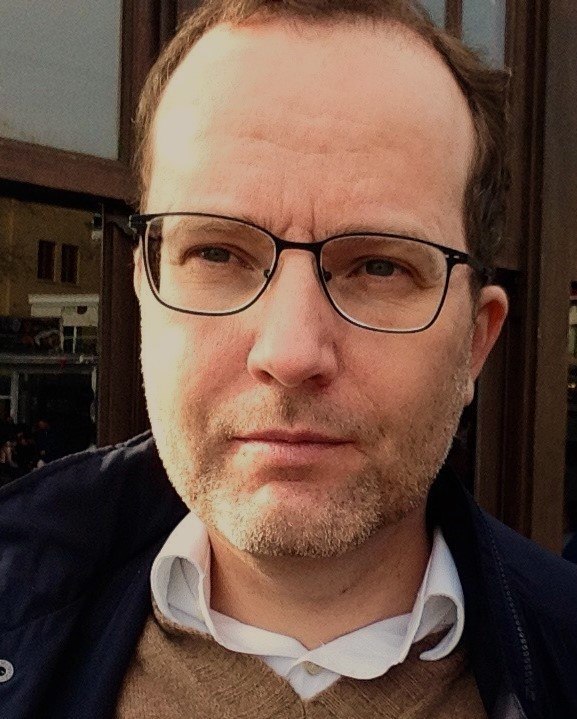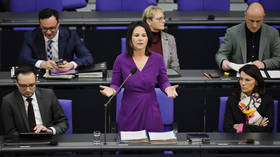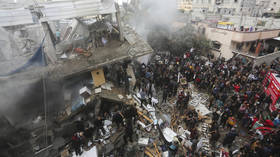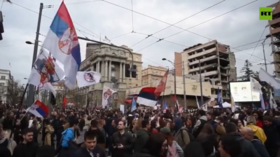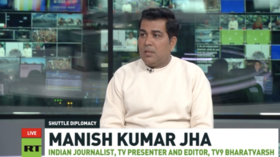How a Jewish Kremlin critic was almost canceled in Germany for speaking out against Israel

The well-known Russian-American journalist Masha Gessen – author of bestselling books and a staff writer at the New Yorker magazine – has become embroiled in a scandal about the Holocaust and Israel’s ongoing assault on the Palestinians.
Comparing the Warsaw Ghetto with Gaza earned Gessen, who is Jewish, a canceling, if in an oddly roundabout way: She had been awarded the German Hannah Arendt Award for Political Thought. While the prize was not rescinded, its two sponsors, the Heinrich Boll Foundation and the City of Bremen, publicly signaled their displeasure with the recipient: Bremen’s top burghers, in effect, harumphed they would not host a ceremony for such an author, then the Foundation demonstratively declared its withdrawal from an event that was no longer happening anyhow, and, to top it all off, the University of Bremen also hurried to let everyone know that its doors are closed to Gessen as well.
Gessen was not even as daring as the Palestinian scholar and writer Refaat Alareer, who thought Gessen’s comparison through to its logical conclusion long before she even made it: If Gaza resembles the Warsaw Ghetto, then the Palestinian Resistance resembles those Jews rising up in that Ghetto in 1943. Gessen is a New York intellectual, while Alareer is one from Gaza. His “cancelation” turned out to be all-encompassing: He was deliberately murdered, together with several family members, by Israel. His killing was preceded by social-media character assassination, which involved the prominent American-Jewish culture-war bully Bari Weiss.
Gessen still got the prize in the end, but in a “scaled-down” ceremony and not in public, at an undisclosed venue (Gessen bizarrely cited fear of “Russians” as the reason for the semi-secrecy, but let’s not dwell on silly things).
In short, what is supposed to be a distinction was handled as if it were something to be ashamed of – for its German sponsors. Handing out an award while, at the same time, sort-of-canceling its recipient is, of course, farcical. Imagine, if you will, a marriage proposal coming with a rider that the proposer would not like to be seen too much in public with the proposed.
Especially in Germany, treating a Jewish awardee in this manner should have been a self-evident no-no. For it is painfully reminiscent of how, in the worst old days, all too many ethnic Germans who were not themselves card-carrying Nazis but adapted to its creed and treated their (former) Jewish acquaintances when the regime pressure mounted as such: “Surely you understand I have nothing against you, but could we please avoid being seen with each other from now on? Nothing personal, you know.”
How did this happen? German tact is legendary, of course, but in this case, more serious issues are at stake. Gessen is no stranger to controversy. Indeed, as her off-hand blaming of “Russians” in the context of a very German fiasco reveals, she and the Russian state have not seen eye to eye for a long time, and the relationship has not been improving recently: Gessen has just been put on an Interior Ministry wanted list under the charge of spreading misinformation about the Russian army. The core of the issue is that she has accused Russian forces of atrocities in the Ukrainian town of Bucha, and Russia rejects these accusations as false.
Against that background, it is a special irony of the Arendt Award affair that Gessen has now been attacked for, in essence, agreeing with Russian President Vladimir Putin: The latter warned as early as October that Israel should not adopt tactics similar to those used by Nazi Germany in its 1940s siege of Leningrad (now St. Petersburg), where Putin’s family suffered severely. Gessen took much longer to arrive at the same place, but her comparison between the Warsaw Ghetto and Gaza points in precisely the same direction. Canceled together with Putin – that must be a whole new experience for Gessen.
The long-standing tension between Gessen and the Russian authorities did not cause the scandal in Germany. On the contrary, Gessen’s criticism of the Russian government is really her main stock-in-trade and played a key role in getting her the Hannah Arendt Award in the first place. That part of Gessen's work was welcome, especially, it is fair to assume, at the Boll Foundation. The foundation is, after all, the key civil-society influence organization of the hyper-“Atlanticist,” fiercely anti-Russian, and militarist Green Party, which has given Germany – and the world – Berlin’s comically undiplomatic and incompetent diplomat-in-chief, Annalena Baerbock.
When, however, Gessen found the courage to speak her mind about Israel’s actions in Gaza, the sponsors of the prize got cold feet. If Gessen’s denunciation of the assault on Gaza as akin to the Nazi “liquidation of the Warsaw Ghetto” had come out earlier, she would most likely never have received the award. But as the recipient had already been announced – and the independent jury stuck by Gessen – all that remained to do for the discomfited sponsors was to signal as much distance as still possible. Hence, the odd result of a Schrodinger’s prize that, just like Israel’s nuclear arsenal, is there but also not quite there.
Clearly, the good old Western double standards are alive and well. Criticism of Russia gets a big cookie (sprinkled with €10,000 in prize money); but criticism of Israel is not welcome. Since, in this case, both came from the same person, the scandal has shown with preposterous precision that Western elites follow the geopolitics of friend and foe: Our friends can get away with, literally, mass murder. In fact, we will help them commit it. Never mind that complicity in genocide is punishable under the UN 1948 Genocide Convention no less than the crime itself, and there already are attempts to launch charges accordingly.
The West’s foes, however, are held up to stringent standards. The overall impression is one of breathtaking hypocrisy. The ultimate irony here is that that impression, in turn, has real geopolitical effects: The West has become so proficient at discrediting its own claims to “value” superiority that it is undermining its own global influence. A “tectonic shift” in the world order was well underway before the Israeli-Western slaughter in Gaza. But the latter is now certain to catalyze it. And the West has only got itself to blame.
Gessen’s case shows how impervious to learning that Western pattern is, for two reasons. First, even in Germany, Gessen’s Jewish identity did not protect her. You would think that Germans would think twice before going after a Jewish author who has something to say about Israel and the Holocaust. Nope. It is tempting to think of this failure as a German particularity, but, unfortunately, it is more widespread. In fact, there is a general Western pattern of not “only” suppressing Palestinian and pro-Palestinian voices but of censoring “even” Jews when they dare criticize Israel.
Second, Western Russophobes will howl with rage and pain, but Russian President Vladimir Putin is right: Even on the worst possible reading, Russia’s record in Ukraine, almost two years after the February 2022 invasion, is substantially better than that of Israel in Gaza after two months of relentless, indiscriminate bombing, starvation, siege, and systematic and wholesale destruction of vital infrastructures.
Likewise, almost all Gazans have by now been displaced; millions of Ukrainians as well, but far from a majority. And yet, it is criticizing Israel – not Russia – that got Gessen into trouble. So, we are not only looking at double standards but especially egregious ones: In much of Western public opinion, Israel is not merely getting away with what Russia can’t get away with. Rather, Israel is getting away with things much worse than what Russia actually does.
Finally, there is the issue of comparison. Gessen has walked into a trap so obvious that one has to ask if she did it on purpose. Israel, its extremely aggressive lobbies in the West, and those Western elites complying with both have developed an absurd habit: According to their rules, comparing the Holocaust with anything is absolutely verboten, as if this horrific genocide had been an event outside human history. Yet, especially those who can’t stop shouting “never again,” make no sense when condemning all and any comparison. How, then, are we supposed to know when something similar is happening “again” if we cannot even compare?
But the underlying issue is, of course, not one of intellectual confusion but of deliberate, politically motivated dishonesty. Ask yourself a simple question: What is a comparison? It is holding up different (not the same, by definition) things against each other in your mind on the suspicion that they may have similarities. To be precise – enough similarities so that the comparison can offer you fresh insights. If it works – great, you have learned something. If it doesn’t, you’ve also learned something: Namely that the two things aren’t that similar.
Those afraid of such an elementary procedure which should make ourselves smarter and maybe even a little better, morally, simply fear its results, most likely because they know them all too well. And that is the core of this scandal: Gessen was not really semi-canceled because she joined those who have long made plausible comparisons between Nazi methods and current Israeli methods in Gaza, but because the comparison does produce terrible similarities.
No, the Holocaust and Israel’s devastation of Gaza are not the same (frankly, duh…), but they are both instances of genocidal attacks. And of bystanders who abandon the victims or even support the perpetrators. Hannah Arendt would have seen this no less than Gessen. No wonder many Zionists could not stand her either.
The statements, views and opinions expressed in this column are solely those of the author and do not necessarily represent those of RT.
